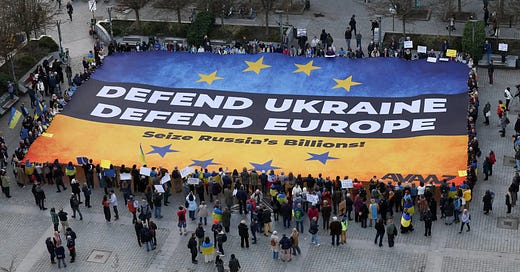Denial is not a River in Ukraine
Ambassador Chas Freeman: European and US-Neocon outrage over Trump’s rapprochement with Russia isn’t about the war—it’s about the collapse of their illusions.
Pundits in mainstream media have been widely criticising Donald Trump’s negotiation strategy as “giving Putin everything he wants.” However, as Ambassador Chas Freeman argues in a recent interview on Neutrality Studies, this view completely ignores the realities on the ground. Russia already got most of what it wanted. It controls significant portions of Ukraine, and the ongoing war only risks further territorial losses for Kyiv. Trump’s position is not about concessions, it’s about acknowledging a battlefield reality that many Western leaders simply ignore.
Freeman argues that Trump’s real goal is not simply ending the war in Ukraine but resetting U.S.-Russia relations. Washington’s decades-long policy of vilifying Moscow has led to a dangerous, entrenched hostility that makes negotiations nearly impossible. By breaking through this narrative, Trump is attempting to shift toward a broader rapprochement—something the current U.S. foreign policy establishment resists.
Europe Caught Between Fear and Inaction
European leaders, Freeman contends, are largely sidelined in these negotiations because they lack a coherent peace proposal of their own. Instead of engaging diplomatically, they remain fixated on outdated Cold War-era thinking—talking of “boots on the ground” or forming a “coalition of the willing.” Such rhetoric only escalates tensions while failing to provide any viable path to peace.
The deeper issue is that Europe has relied on the U.S. for security since 1945 and has never developed an independent strategy for managing relations with Russia. Now, with the U.S. shifting its attention toward China, European leaders are scrambling to formulate a response, debating everything from joint nuclear deterrence to increased military spending—moves that, Freeman warns, risk entrenching military confrontation rather than resolving it.
Neutrality: The Only Viable Path for Rest-Ukraine
Freeman emphasizes that Russia’s core demands remain unchanged since 2021: protection for Russian-speaking populations, Ukrainian neutrality, and a new European security architecture. The first demand is essentially settled from Moscow’s perspective, given its annexation of eastern Ukrainian territories. The second—Ukraine’s neutrality—is where negotiations could still take place. Historically, Ukraine was recognized as independent under the condition that it would remain neutral. However, its later NATO aspirations have fueled the current crisis. Now, with NATO leaders openly admitting that Ukrainian membership is “off the table,” there should be a growing realization that neutrality will be the only realistic solution.
For Russia, this means not just a formal pledge from Kyiv but a broader security guarantee akin to Austria’s 1955 State Treaty—ensuring Ukraine remains outside of military blocs while respecting the rights of minorities. Yet, Western policymakers remain trapped in their own narratives, refusing to acknowledge that a neutral Ukraine could be a stabilizing force rather than a loss.
Illusions VS Reality
The core-issue of western warmongers who are still clinging to the idea of imposing a “just peace” (aka. a complete Ukrainian victory and the punishment of Russia) is the obvious gap between rhetoric and battlefield reality. While many still keep the mirage alive that Ukraine will “win” or that NATO expansion remains viable, the brutal military facts suggest otherwise. The U.S., under Trump, seems to be pragmatically realigning itself with geopolitical realities, whereas Europe remains stuck in their long-disproven paradigm.
If the remaining part of Ukraine is to have a future, it needs to return to the neutrality it upheld before 2014 and do everything it can to not once again become a staging ground for a proxy-war. The question is whether Western leaders and Ukraine’s internal politics can accept this in time to prevent further destruction—or whether they will continue down a path of self-defeating policies that prolong the conflict and the dying.





We, humans, are natural beings. We live in flocks, like all beings in the animal world. Each flock has a leader. This leader has been chosen by the flock, in a very intelligent way and far more intelligent than the human leader is chosen. Intelligence is something that goes further and deeper than rational intelligence: rational intelligence can be easily manipulated, and can manipulate. Deep or high intelligence knows, senses, makes aware of what is essential for the group to survive,
Europe is a flock. Its leaders have not been chosen as the leading wolf of a flock of wolves would have been chosen. They took their power via manipulation, misleading, not interested in what is essential for the flock to survive, but what boosts their own ego and social position, bank saldos, and own possession.
This means that the EU leaders do not sense the real enemy, that they fool the European people, and themselves.
There are among the European flock, who prove to be real leaders, like Fico.
I trust the law of nature, and that the flock will start sensing and following, uniting, and excluding those who are a threat to the flock's future.
My comment has been inspired by an in May 2024 published study: Prey can detect predators via electroreception in air: https://www.pnas.org/doi/full/10.1073/pnas.2322674121
The predators of the European peoples are not in Russia, but in Europe, in Brussels.
Don't confuse Trump with a statesman. He may have brokered a deal with Russia but only for his own purposes, either to repay a debt or to lay the foundation for further business. Speaking about him like he has a normal mind is ludicrous. Love your show!